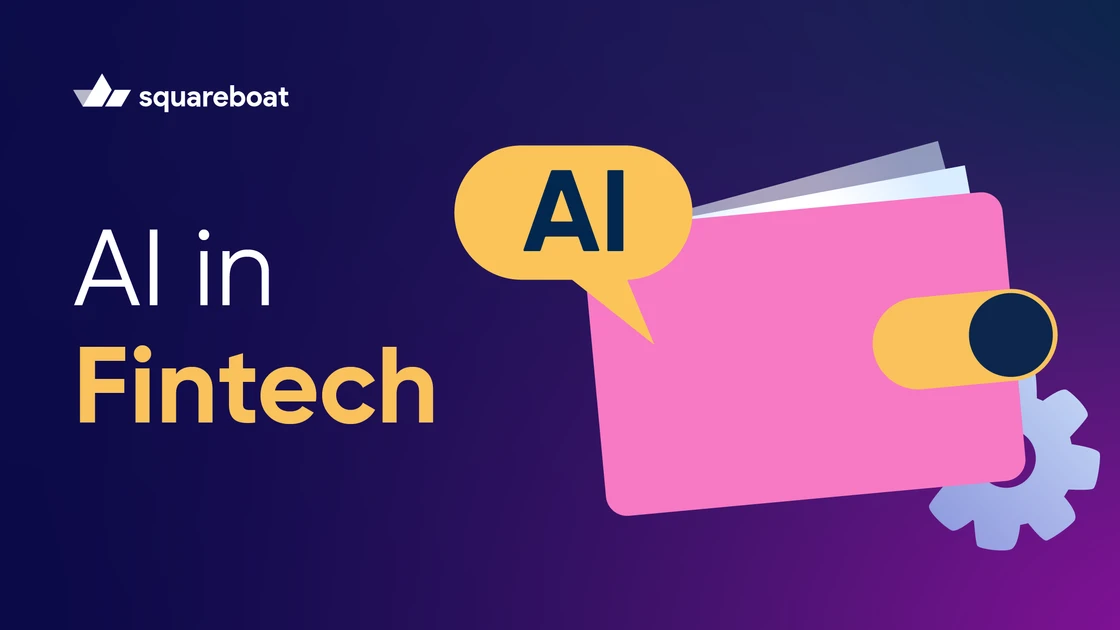Financial Technology (better known as FinTech) refers to the use of modern technology to deliver and innovate financial services. It brings together the power of software development, data analytics, cloud computing, and artificial intelligence to modernize traditional financial services. Once, paying bills meant standing in long queues; now we have one-time payments, making it effortless. AI in fintech has been reshaping finance from the ground up, be it predictive analytics, fraud detection, chatbots, or personalized financial services, setting new standards for the finance sector.
What is AI in Fintech?
The introduction of artificial intelligence tools like advanced algorithms, speech and language understanding, and intelligent data processing in FinTech has led to the development of innovative solutions that have made financial services easier for customers to use. Additionally, it has enabled fintech companies to automate customer support, streamline operations, enhance risk management, and more. By automating many manual tasks that were previously time-consuming and prone to error, AI has improved accuracy and efficiency.
The Strategic Need of AI in Financial Technology
The FinTech industry thrives in a challenging environment that includes high competition, quick technological evolution, and increasing amounts of data. AI provides innovative ways to deal with such scenarios.
First, the volume of daily financial data is so vast and complicated that traditional data-processing tools cannot handle it. AI algorithms help here by processing this data and quickly coming back with patterns, insights, and decisions supporting them. Second, more than ever, we need fraud prevention as cyber threats emerge. AI is great at uncovering unusual transaction behavior, which indicates fraud. Third, the current customers are in a hurry and must be provided with personalized services right away. AI can examine the users' behavior and preferences and design financial solutions accordingly.
Hence, in today’s dynamic fintech sector, AI is essential for driving innovation and keeping pace with today’s fast-evolving financial world.
Artificial Intelligence as a Catalyst in Finance
AI is changing the financial sector in different ways. It benefits the industry by providing its support through virtual assistants, controlling credit scoring and underwriting, and executing algorithmic trading platforms that process big data. It also raises the achieved level of efficiency in the bank’s employees by preventing illegal activities based on transactions. It thus gives a possibility to make financial forecasting by studying the market and knowing the customers. Moreover, AI is equipped to process such a large amount of data in a very short time. AI guarantees very quick data processing capabilities, thus enabling financial institutions to make valuable decisions in time for their customers and themselves. Hence, AI acts as a catalyst, accelerating fintech evolution into a new era of smarter, faster, and more secure financial services.
Understanding the Benefits of AI Across Financial Operations
The impact of AI on financial operations is undeniable. By automating time-consuming tasks and analyzing mountains of data in seconds, AI benefits the finance industry in numerous ways. Let’s explore this one by one.
- Increased Efficiency and Productivity: Bots carrying out tasks and processing them fast are responsible for long-term and higher business performance through workforce production, and thus minimizing operational costs.
- More Accuracy and Less Error: It is essential to say here that the algorithms based on AI commit fewer errors than people do, which means that they provide the financial industry and its customers with more accurate data and transactions.
- Customer Satisfaction: High customer satisfaction is due to the services, which are tailored to the customer’s needs and delivered promptly, as well as proactive support.
- Data security and Fraud Detection: Offensive operations and activities in financial technologies can be more efficiently tackled through AI systems that combine knowledge of customer and institution profiles.
- AI Risks Better Management: AI is capable of delivering more precise assessments of risks, which forces the financial industry to act on well-justified refineries and limit potential losses.
Untreated Revenue Streams: AI technologies can handle the development of advanced financial products and services, making them a good platform for new sources of revenue.
AI in Fintech: Innovative Use Cases Leading the Way
AI is at the forefront of financial transformation. In this section, we’ll explore AI use cases and real-world examples showing how fintech companies have used AI to grow.
- Algorithmic Trading: Using AI-powered models to analyze vast amounts of market data, spotting and executing trades without human delay is known as algorithmic trading. Companies like XTX Markets exclusively employ AI-powered models for parsing market data and carrying out a large number of rapid-fire trades, thus leading to a competitive advantage.
- Customer Service Automation: Using chatbots and virtual assistants to handle customer queries and provide support, reduces wait time, and personalizes interactions. Bank of America's AI service chatbot, Erica, now deals with millions of customer inquiries and delivers immediate and personalized help.
- Portfolio Management: Using ML and geAI, portfolio management is enhanced, leading to improved productivity and engagement. Generative AI is the main technological engine providing Schroders Capital with the capability to automate investment analysis, enhance decision-making, and increase productivity.
- Anti-Money Laundering: AI-based AML systems monitor and flag suspicious financial transactions faster than traditional rule-based systems. Using this, HSBC has significantly increased fraud detection rates and reduced the time required for investigations.
- Financial Forecasting: AI-powered forecasting models use machine learning to predict financial metrics. Goldman Sachs’ market makes predictions better, and also makes the company’s business processes more efficient by using this.
Climate Finance: AI here helps to identify and evaluate investments based on environmental impact and sustainability criteria. BNP Paribas depends on this to identify climate-related investments and check whether they meet sustainability objectives.
Key Challanges of AI in Fintech
In spite of the positive sides, the adoption of AI in Fintech industry has a number of its own problems during its implementation:
- Data Privacy: Working with private financial information causes privacy and ethical issues to come to the fore.
- Regulatory Hurdles: The constant changing of AI regulations is a complex task in this day and age.
- Bias in Algorithms: AI systems may unknowingly maintain social or economic biases that are already present in the data used for training purposes.
- Cost of Implementation: The high costs of development and transfer may prevent some small firms from implementing AI.
Transparency: The hidden "black box" feature of some AI systems is a major obstacle when it comes to justifying the decisions made to regulators or the customers.
These are the challenges that must be overcome to lead successfully in fintech. Every challenge becomes a chance to lead smarter, faster, and better.
Future Landscape of AI in the Fintech Market
AI in fintech has already come a long way, from a manual, paper-heavy process to digital-first automation. When we look at the future of AI in the Fintech sector, it’s clear that we’re in for some rapid changes and a strong direction toward transformation. AI is ready to make operations more efficient, enhance personalization, and support greater financial inclusion. We can look forward to more personalised, predictive, and efficient financial systems.
What is more, we’ll see hyper-automation and even voice-driven banking interfaces. As banks and other financial companies are doubling down on AI projects, quantum technologies will be at the core of regulatory compliance, green finance, etc. These technologies, in combination, hold the promise of a future financial system that is more intelligent and safe than the current one, also being more accessible, consequently putting FinTech at the forefront of the digital revolution.
Unlock Fintech Innovation with Squareboat’s AI Expertise
At Squareboat, we believe that the integration of AI into FinTech is not just about the digital capabilities but also the combination of the right technology and user-centered design, together with open and flexible models. We empower fintech companies by building AI-driven solutions. Whether you're starting your AI journey or scaling an existing product, we provide the expertise and services you need in the Fintech industry. Therefore, Squareboat will ensure that you are supported at all stages.
Conclusion
The significance of AI in the financial technology sector is not a concept that is yet to be implemented in the future, but a prerequisite for companies that want to innovate, stay on the frontline, and meet customers’ changing demands. The latest advancements in AI technologies that are shaping the financial sector have a lot of benefits. With AI at its core, the future of fintech is bright. However, the challenges involved in the adoption of AI must be met with appropriate resources and guidance from a strategic point of view.
The message is clear: integrating AI is essential for fintech firms that want to lead and succeed in the fast-changing world of finance.


